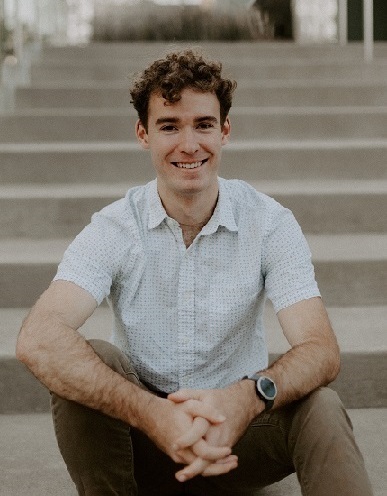Paying It Forward

Benjamin Wright
Speech-Language Pathologist, Rock Creek of Ottawa
Benjamin Wright found himself in a position that a lot of students do during their college careers. “I didn't know what direction I was going in.”
But his childhood and adolescence offered stepping stones for his future path.
“I received a lot of speech therapy as a kid, and eventually, I caught up to my classmates,” Benjamin recalled. Later, both of his grandmothers received speech-language pathology services, one for language related to a neurological condition and the other for dementia.
That’s when Benjamin started to connect the pieces and realized that he was interested in studying communication disorders.
“It all came together, and I decided to study speech-language pathology.”
After he completed his undergraduate degree at the University of Arkansas, Benjamin began exploring graduate programs. His interests in the medical aspects of the field led him to the University of Washington and the Master of Science in Medical Speech-Language Pathology.
In this interview, the 2023 graduate talks about his experience in the program and how it helped set him up for success in his career.
Tell us about your current job.
I’m a speech-language pathologist at a rural skilled nursing facility, Rock Creek of Ottawa in Ottawa, Kansas. I see a range of patients — from those who are expecting a short stay and need to receive rehab before returning home or to assisted living, to long-term patients who might have Parkinson’s disease, Alzheimer’s disease or dementia and need cognitive communication treatment.
I also work in assisted living as part of the Rock Creek of Ottawa Assisted Living Facility. And lastly, I go out to a dementia care home. I work with residents on things like orientation (to self, place and purpose) and swallowing. But mainly I do a lot with cognitive communication processes and things like staff, caregiver and family communication training or environmental modifications that help alleviate anxiety for the residents.
Why did you choose the UW Master of Science in Speech-Language Pathology? What about the program appealed to you?
I’m interested in neurodegenerative diseases and Alzheimer's disease, so getting an expansive view of the medical side with the MedSLP track was really appealing to me. And getting medical placements for the practicums and internship was important. Those placements are difficult to get, especially during a time like COVID. The UW has great connections, so I could get placements in rehab, acute care and other medical settings.
What were your practicum and internship experiences like?
They were awesome! The first year we were in house at the UW clinic. It’s a rotation, so one way or another, you're going to do it all — adults, children, voice or other different areas. That first year is for really shoring up your documentation. That's a huge part of the career — producing evidence-based documentation that’ll be approved by insurance providers.
The second year was when we started to grow our wings and go out. My first placement was at a hospital in Puyallup doing inpatient rehab. Those were full days, two or three days a week, where I got my boots wet and figured out what it’s like to handle a full caseload. Then I went into acute care at the University of Washington Northwest Hospital. That was figuring out what it's like to be in a medical setting working with other medical professionals, like physical and occupational therapists, nurses, doctors and radiologists.
My last placement was in a hospital in Colorado Springs in an outpatient clinic. The clinic is open to anyone, so I saw a full range — voice disorders, cognitive communication disorders, language disorders, cerebral vascular accidents, head and neck cancer and more. This placement is where you find out if you’re ready for the real world. It was full time, but the stakes were a little lower because I had a supervisor who was there to help guide me with my cases.
Tell us about your instructors and what they brought to the program.
Our instructors have had 10, 15, 20 years of experience as speech-language pathologists. Sometimes in academia, you have professors who have only done academia. Here, everybody has been an actual speech-language pathologist. They’ve had boots-on-the-ground experience combined with insightful research, relevant clinical interests and funding. It was awesome to have folks who had experience, but also aren't so far removed from the student experience to know how much support one student might need with a difficult case.
They also would sometimes let you flail in the wind a little bit. Part of the learning process is to know that I don't know what's happening, but I need to figure out the best way I can manage the situation. If I didn't have the room to fail a little bit, I wouldn't be where I am now.
What would you say to someone who is thinking about applying to this program?
You're applying to a world-class program that's going to prepare you for the real world in a range of settings. It's a difficult, rigorous program. But it'll make you a well-prepared clinician who’s able to walk into any room, anywhere and feel like you can help. I’m confident that I can step into the medical arena and know how I can contribute.